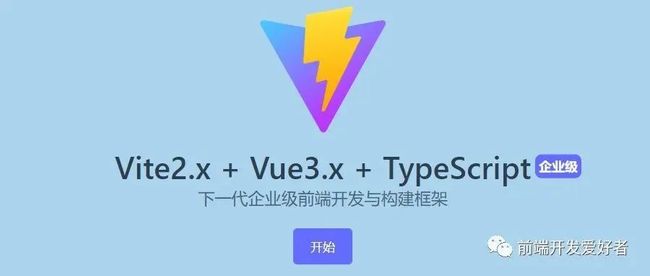Vue3 + TypeScript 使用教程
至于技术栈为什么由 react 转向 vue3,也是因为今年换了新工作,公司技术栈以vue3为主,刚好前段时间又接手了一个项目,就直接采用 Vue3 script setup typescript 开发,于是今天就想给大家分享下 script setup 结合 typescript 使用的一些技巧,如果这些技巧能够帮助到你,记得给我点个赞呦
环境搭建
环境搭建这里就不详细介绍了,可以直接使用官方的方式创建
npm init vue@latest这一指令将会安装并执行 create-vue,它是 Vue 官方的项目脚手架工具。你将会看到一些诸如 TypeScript 和测试支持之类的可选功能提示:
✔ Project name: …
✔ Add TypeScript? … No / Yes
✔ Add JSX Support? … No / Yes
✔ Add Vue Router for Single Page Application development? … No / Yes
✔ Add Pinia for state management? … No / Yes
✔ Add Vitest for Unit testing? … No / Yes
✔ Add Cypress for both Unit and End-to-End testing? … No / Yes
✔ Add ESLint for code quality? … No / Yes
✔ Add Prettier for code formatting? … No / Yes
Scaffolding project in ./...
Done. 如果不确定是否要开启某个功能,你可以直接按下回车键选择 No。在项目被创建后,通过以下步骤安装依赖并启动开发服务器:
cd
npm install
npm run dev 这里就不做过多的讲解了,这篇文章的重点还是在 script setup typescript 结合使用上
ref()
ref()接受一个内部值,返回一个响应式的、可更改的 ref 对象,此对象只有一个指向其内部值的 property .value。
类型定义
function ref(value: T): Ref>
interface Ref {
value: T
} 为 ref() 标注类型
ref() 标注类型有三种方式:
通过泛型参数的形式来给
ref()增加类型
import { ref } from 'vue'
const initCode = ref('200') 如果是遇到复杂点的类型,可以自定义
interface然后泛型参数的形式传入
import { ref } from 'vue'
interface User {
name: string
age: string | number
}
const user = ref({
name:'前端开发爱好者',
age: 20
}) 通过使用
Ref这个类型为ref内的值指定一个更复杂的类型
import { ref } from 'vue'
import type { Ref } from 'vue'
const initCode: Ref = ref('200') 三种方式推荐
比较推荐使用前两种方式,前两种方式其实都是以泛型的形式来标注类型的
第三种方式需要额外的引入:
import type { Ref } from 'vue'所以不是很推荐(本着能少写一行是一行原则)
reactive()
reactive() 返回一个对象的响应式代理。
类型定义
function reactive(target: T): UnwrapNestedRefs 为 reactive() 标注类型
reactive()标注类型有两种方式:
直接给声明的变量添加类型
import { reactive } from 'vue'
interface User {
name: string
age: string | number
}
const user:User = reactive({
name:"前端开发爱好者",
age:'20'
})通过泛型参数的形式来给
reactive()增加类型
import { reactive } from 'vue'
interface User {
name: string
age: string | number
}
const user = reactive({
name:"前端开发爱好者",
age:'20'
}) 两种方式推荐
不推荐使用 reactive() 的泛型参数,因为处理了深层次 ref 解包的返回值与泛型参数的类型不同。推荐直接给声明的变量添加类型。
computed ()
接受一个 getter 函数,返回一个只读的响应式 ref 对象,即 getter 函数的返回值。它也可以接受一个带有 get 和 set 函数的对象来创建一个可写的 ref 对象。
类型定义
// 只读
function computed(
getter: () => T,
debuggerOptions?: DebuggerOptions
): Readonly>>
// 可写的
function computed(
options: {
get: () => T
set: (value: T) => void
},
debuggerOptions?: DebuggerOptions
): Ref 为 computed() 标注类型
computed()标注类型有两种方式:
从其计算函数的返回值上推导出类型
import { ref, computed } from 'vue'
const count = ref(0)
// 推导得到的类型:ComputedRef
const user = computed(() => count.value + '前端开发爱好者') 通过泛型参数显式指定
computed()类型
const user = computed(() => {
// 若返回值不是 string 类型则会报错
return '前端开发爱好者'
}) 两种方式推荐
自动推导类型虽然简单快捷,但是还是希望手动的去指定其类型,这样更加利于代码的可维护性,所以这里推荐大家使用通过泛型参数显式指定 computed() 类型
defineProps()
为了在声明 props 选项时获得完整的类型推断支持,我们可以使用 defineProps API,它将自动地在 script setup 中使用
为 defineProps() 标注类型
从它的参数中推导类型:
const props = defineProps({
name: { type: String, required: true },
age: Number
})通过泛型参数来定义
props的类型
const props = defineProps<{
name: string
age?: number
}>()当然了,我们也可以把以上的泛型参数定义成一个单独的 interface
interface Props {
name: string
age?: number
}
const props = defineProps() 以上的两种方式虽然都可以很方便的
标注类型, 但是失去了对props定义默认值的能力
目前官方也给出了解决方案,但是目前这个方案还处于实验性,并且需要显式地选择开启。
// vite.config.js
export default {
plugins: [
vue({
reactivityTransform: true
})
]
}通过对 defineProps() 的响应性解构来添加默认值:
interface Props {
name: string
age?: number
}
const { name = '前端开发爱好者', age = 100 } = defineProps()
defineEmits()
为了在声明 emits 选项时获得完整的类型推断支持,我们可以使用 defineEmits API,它将自动地在 script setup 中使用
为 defineEmits() 标注类型
defineEmits() 标注类型直接推荐泛型形式
import type { GlobalTheme } from 'naive-ui'
const emit = defineEmits<{
(e: 'setThemeColor', val: GlobalTheme): void
}>()虽然官方还推荐了运行时自动推导的一种形式,但是本人不是很推荐
defineExpose()
defineExpose() 编译器宏来显式指定在 script setup 组件中要暴露出去的 property,使得父组件通过模板ref的方式获取到当前组件的实例
为 defineExpose() 标注类型
defineExpose() 类型推导直接使用参数类型自动推导即可
import { ref } from 'vue'
const name = ref('前端开发爱好者')
defineExpose({
name
}) provide()
provide()供给一个值,可以被后代组件注入
类型定义
function provide(key: InjectionKey | string, value: T): void 为 provide() 标注类型
为 provide() 标注类型, Vue 提供了一个 InjectionKey 接口,它是一个继承自 Symbol 的泛型类型,可以用来在提供者和消费者之间同步注入值的类型
import type { InjectionKey } from 'vue'
// 建议声明 key (name) 放到公共的文件中
// 这样就可以在 inject 的时候直接导入使用
const name = Symbol() as InjectionKey
provide(name, '前端开发爱好者') // 若提供的是非字符串值会导致错误 以上方式是通过定义 key 的类型来标注类型的,还有一种方式直接 key 采用字符串的形式添加
provide('name', '前端开发爱好者')inject()
inject()注入一个由祖先组件或整个应用供给的值
类型定义
// 没有默认值
function inject(key: InjectionKey | string): T | undefined
// 带有默认值
function inject(key: InjectionKey | string, defaultValue: T): T
// 使用工厂函数
function inject(
key: InjectionKey | string,
defaultValue: () => T,
treatDefaultAsFactory: true
): T 为 inject() 标注类型
provide() 的 key 的类型是声明式提供的话(provide()类型标注的第一种形式)
inject() 可以直接导入声明的 key 来获取父级组件提供的值
// 由外部导入
const name = Symbol() as InjectionKey
const injectName = inject(name) 如果 provide() 的 key 直接使用的字符串形式添加的, 需要通过泛型参数声明
const injectName = inject('name') 模板 ref
模板 ref 需要通过一个显式指定的泛型参数和一个初始值 null 来创建:
(null) 组件 ref
有时,你可能需要为一个子组件添加一个模板 ref,以便调用它公开的方法
const handleLog = () => console.log('前端开发爱好者')
defineExpose({
open
})
为了获取 MyModal 的类型,我们首先需要通过 typeof 得到其类型,再使用 TypeScript 内置的 InstanceType 工具类型来获取其实例类型:
import Child from './Child.vue'
// 为子组件 ref 声明类型
const child = ref | null>(null)
// 调用子组件中的方法
const getChildHandleLog = () => {
child.value?.handleLog()
}
事件处理器
原生的 DOM 事件标注类型
function handleChange(event: Event) {
console.log((event.target as HTMLInputElement).value)
}
